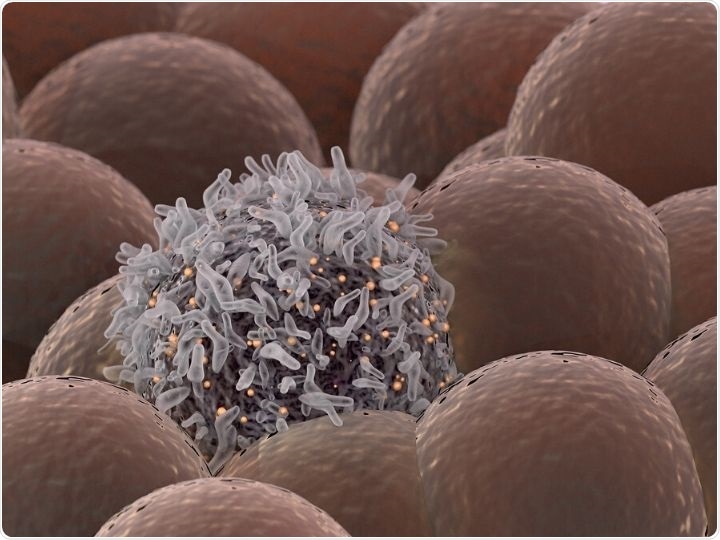Immunotherapy has revolutionized cancer treatment and it is not an overstatement. Navin Varadarajan, a University of Houston M.D. Anderson Professor of chemical and biomolecular engineering plans to enhance it.

Immunotherapy works by harnessing the power of the immune system and its ability to recognize and eliminate cancer cells, like the one seen here among healthy cells. Image Credit: GettyImages.
Immunotherapy exploits the power of the immune system and its capability to identify and eradicate cancer cells. Most of the power is present within T cells—white blood cells that safeguard the body from infection and eliminate mutant cells upon recognition by T cell receptors.
Recently, genetically engineering T cells for redirecting immune responses received approval from the Food and Drug Administration. Even though this Adoptive Cell Therapy (ACT), which is based on infusing in vitro grown T cells bearing either T cell receptors or chimeric antigen receptors showed dramatic and durable responses, the responses of the patients differ.
Current data points out that variability in the manufactured T cell products might be the primary determinant of clinical success.
Since cellular infusion products are a heterogeneous mixture of cells, mapping the complexity of the population requires the ability to identify the function and molecular profiles of cells at single-cell resolution. Our objective is to develop and rigorously validate a transformative technology that integrates cellular functions and activities with their deep molecular signatures at single-cell resolution in high-throughput.”
Navin Varadarajan, M.D. Anderson Professor, Chemical and Biomolecular Engineering, University of Houston
Varadarajan received a $1.8 million grant from the National Institute of General Medical Sciences and intends to use it to create and validate Multiscale Intelligent Convergence (MusIC). The MusIC combines advances in dynamic cellular imaging, molecular profiling, and artificial intelligence (AI) to provide an unparalleled understanding of the function of immune cells being prepared for immunotherapy.
Other members of the project include Badri Roysam, Hugh Roy, and Lillie Cranz Cullen University Professor and Chair of electrical and computer engineering at UH, Hien Van Nguyen, assistant professor of electrical and computer engineering at UH, and Sattva Neelapu, a medical doctor at MD Anderson Cancer Center.
MusIC will provide multi-scale data from molecules to subcellular dynamics to cell-cell interaction biology on the same cells across thousands of cells. Given the heterogeneity in the composition of cells being used for ACT, it serves as the ideal system for the development and validation of MusIC. By validating it directly on patient samples, we will be able to identify attributes of cells essential for patient benefit.”
Navin Varadarajan, M.D. Anderson Professor, Chemical and Biomolecular Engineering, University of Houston
Varadarajan expects that successful execution will allow the validation of MusIC as a platform for analyzing multi-scale cell biology. This in turn would drive dependable biomanufacturing of T cell infusion products and engineering more powerful immune cells that can have a better impact on immunotherapy.